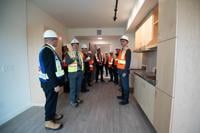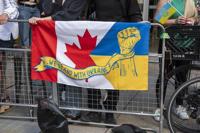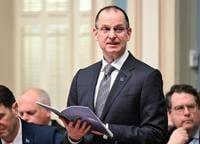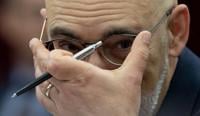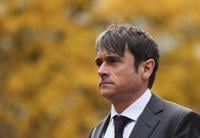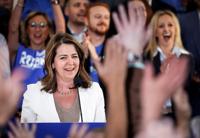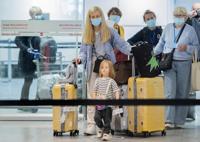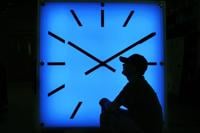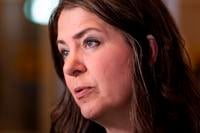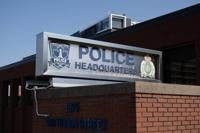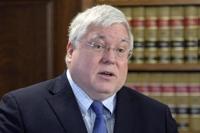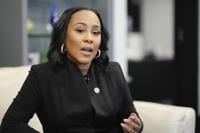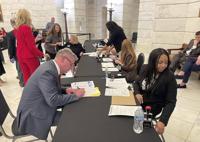MONTREAL - Denis Coderre believes he and the Quebec Liberals can both rise from the ashes.
After a decades-long career in federal and municipal politics, the former Montreal mayor has set his sights on the third level of government, becoming the first candidate to officially seek the leadership of the Quebec Liberal party.
"We need experienced men and women. We need to find ourselves," Coderre said during an hour-long news conference Friday morning in front of Quebec's legislature, during which he spoke at length and frequently interrupted himself to call out to passersby. "I invite all those who feel pushed aside, all the disappointed Liberals, all the Liberals who stayed home … to come back."
Coderre, 60, pitched himself as a seasoned politician who can help the party reconnect with voters after years in the political wilderness. The Quebec Liberals have struggled to find their footing since Premier François Legault led the Coalition Avenir Québec to power in 2018, and the party is polling in single digits with francophone voters.
"I have 40 years of experience in politics. I've always loved this party," he said. "It's important that we come together again."
It remains to be seen, however, whether Quebec Liberals want a political veteran at the helm. "Nobody in the Liberal caucus has expressed interest in having him as a leader," said Philippe J. Fournier, poll analyst and creator of . The Quebec Liberal party, he said, "is trying to renew itself. To show maybe a younger face, new ideas, go after the economic centre but also progressive votes. And Mr. Coderre … does not represent this."
The CAQ and Legault are losing ground in the polls, and Fournier said Coderre has more name recognition than most of the other prospective candidates for the leadership. But a survey earlier this month showed his popularity sliding among Liberal voters.
"If the Liberals find a good leader, they could hurt the CAQ. There's an opening there," Fournier said. "The Liberals have a chance to come back to respectability, but I doubt it's with Coderre."
Coderre is no stranger to political adversity. After sitting as a member of Parliament with the federal Liberals from 1997 to 2013, he was elected mayor of Montreal in 2013. But in a stunning upset, he was defeated in 2017 by Valérie Plante and her left-leaning opposition party, Projet Montréal. Last year, he revealed he attempted suicide after his defeat.
At the time, Coderre announced he was quitting municipal politics. But in 2021, he was back to challenge Plante — and lost again by a wide margin. He then announced he was leaving politics for good.
Fournier said Coderre's patchy record in municipal politics may not serve him well in his latest campaign. "He has this aura of loser. He's been losing winnable elections," Fournier said. "(The Liberals) want to govern. They're not satisfied with just being the opposition. And Mr. Coderre has not won anything in a long time."
Coderre's announcement Friday had been expected for months, but he waited to make his candidacy official while making a pilgrimage along the Camino de Santiago in Spain. "It's important above all to find oneself," he said, "and then to think of the future of the Quebec nation."
During the news conference, Coderre focused heavily on his track record as a federalist, and said he doesn't want to keep debating another independence referendum. The Parti Québécois has been leading in Quebec polls since last fall, and has promised a third referendum, but Coderre referred to the sovereigntist party as merely "the flavour of the month."
The former mayor positioned the Liberals as the only federalist option in the province. Though Legault has no interest in holding another referendum, the CAQ is a nationalist coalition that includes staunch sovereigntists. The provincial Conservative party is also federalist, but holds no seats in the legislature.
Coderre plans to run in the next provincial election in the riding of Bellechasse, south of Quebec City, which is currently held by the CAQ — and where the Liberals came in last place with 4.1 per cent of the vote in 2022.
On Friday, he declared his support for the third link — a controversial transport project that would connect Quebec City to suburbs across the St. Lawrence River. Last week, Legault announced his government is planning to build a third bridge across the river, despite official warnings that it will do little to reduce traffic.
But in other areas, Coderre positioned himself squarely against Legault. In particular, the former mayor said there are not too many immigrants in Quebec; the premier, meanwhile, is pushing the federal government to reduce temporary immigration, which he says is entirely responsible for Quebec's housing crisis.
Coderre also said systemic racism exists in Quebec, which Legault has denied.
While Coderre is the first to announce his candidacy to lead the Liberals, others are expected to throw their hats in the ring. Liberal member Frédéric Beauchemin is expected to announce his decision in August. Other names in the mix include Charles Milliard, who will step down as president of the Quebec federation of chambers of commerce next month, and Victoriaville Mayor Antoine Tardif.
The Quebec Liberals have not had a permanent leader since Dominique Anglade resigned in November 2022, after Legault won a second majority. The leadership race will begin in January 2025, and the party will elect its new leader in June. The next provincial election is scheduled for October 2026.
This report by ¥∫…´÷±≤•was first published June 21, 2024.
— With files from Thomas Laberge in Quebec City.




